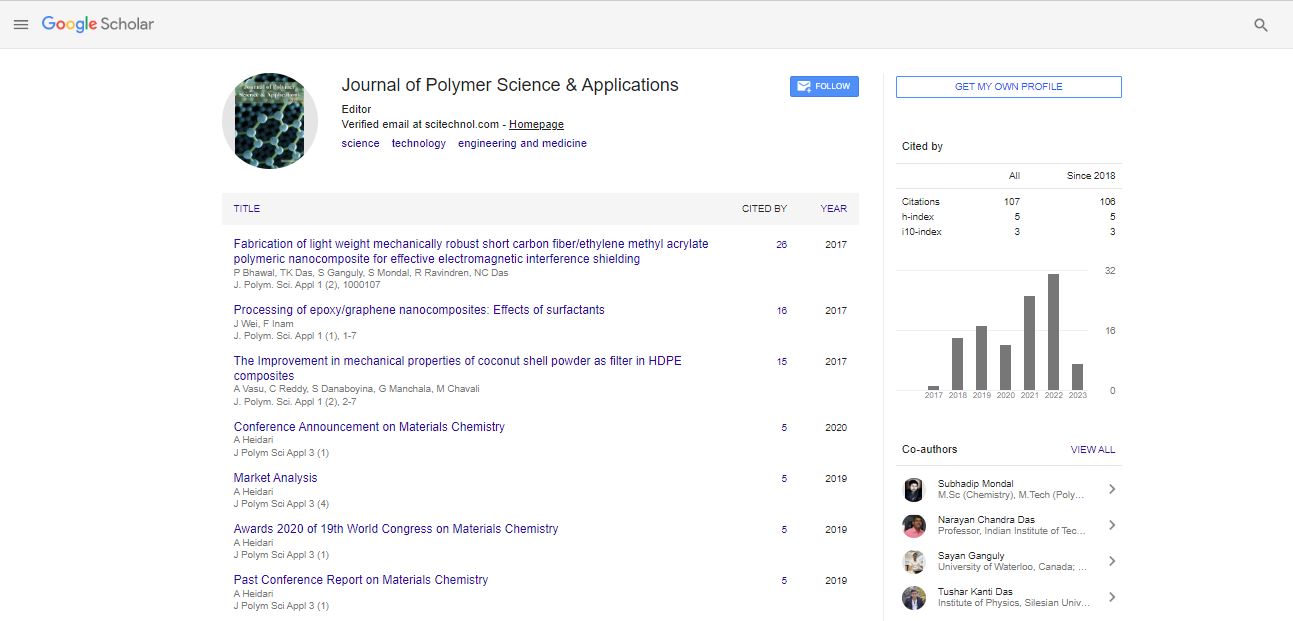Commentary, J Polym Sci Appl Vol: 7 Issue: 2
Advancements in Bio-based Polymers for Sustainable Packaging
Xue Lipan*
Department of Advanced Science and Engineering, Hiroshima University, Kagamiyama, Japan
*Corresponding Author: Xue Lipan
Graduate School of Advanced Science and Engineering
Hiroshima University, Kagamiyama, Japan
E-mail: panxue@gmail.com
Received date: 15 May, 2023, Manuscript No. JPSA-23-106490;
Editor assigned date: 17 May, 2023, PreQC No. JPSA-23-106490 (PQ);
Reviewed date: 01 June, 2023, QC No. JPS-23-106490;
Revised date: 08 June, 2023, Manuscript No. JPSA-23-106490 (R);
Published date: 16 June, 2023, DOI: 10.4172/Jpsa.1000134
Citation: Lipan X (2023) Advancements in Bio-based Polymers for Sustainable Packaging. J Polym Sci Appl 7:2.
Description
The global shift towards sustainable practices has driven the development of bio-based polymers as a viable alternative to traditional plastics in the packaging industry. Derived from renewable sources such as plants and biomass, bio-based polymers offer a more environmentally friendly solution, reducing our reliance on fossil fuelbased plastics. The recent advancements in bio-based polymers for sustainable packaging, highlighting their benefits, applications, and potential to revolutionize the packaging industry in terms of sustainability and eco-friendliness.
Polylactic acid
Polylactic Acid (PLA) has emerged as a leading bio-based polymer for sustainable packaging. It is derived from renewable resources like corn starch, sugarcane, or cassava. PLA offers numerous advantages, including biodegradability, compostability, and a reduced carbon footprint compared to traditional plastics. Recent advancements in PLA research and development have focused on enhancing its mechanical properties, such as flexibility, impact resistance, and heat resistance. These improvements have expanded the range of packaging applications where PLA can be used, making it a versatile option for sustainable packaging solutions.
Polyhydroxyalkanoates
Polyhydroxyalkanoates (PHA) are a family of bio-based polymers produced through the fermentation of renewable feedstocks by bacteria. PHA polymers are biodegradable, compostable, and possess excellent barrier properties against oxygen and moisture, making them suitable for various packaging applications. Recent advancements in PHA production and processing techniques have improved scalability and cost-effectiveness, making PHA a promising alternative to conventional plastics. Researchers are also working on developing PHA blends with other polymers to optimize performance and expand its applications in the packaging industry.
Chitosan-based polymers
Chitosan, derived from the shells of crustaceans, holds promise as a bio-based polymer for sustainable packaging. Chitosan-based polymers exhibit desirable properties such as biodegradability, antimicrobial activity, and excellent film-forming abilities. Recent advancements have focused on improving the mechanical strength, water vapor barrier, and biodegradability of chitosan-based films, enhancing their functionality as packaging materials. These films find applications in food packaging, where the antimicrobial properties of chitosan help extend the shelf life of perishable goods, reducing food waste and enhancing sustainability in the packaging industry.
Lignin-based polymers
Lignin, a natural polymer found in plants, is an abundant and renewable resource that can be harnessed for sustainable packaging. Recent advancements in lignin extraction and modification techniques have enabled the development of lignin-based polymers with improved properties. Lignin-based films and coatings offer advantages such as high UV resistance, gas barrier properties, and thermal stability. These properties make them suitable for applications like food packaging, where protection against light, oxygen, and moisture is vital. By utilizing lignin-based polymers, the packaging industry can reduce its environmental impact and move towards more sustainable packaging solutions.
Conclusion
The continuous advancements in bio-based polymers for sustainable packaging present a promising opportunity to reduce the environmental footprint of the packaging industry. Polylactic Acid (PLA), Polyhydroxyalkanoates (PHA), chitosan-based polymers, and lignin-based polymers offer a range of benefits, including biodegradability, compostability, improved barrier properties, and reduced carbon footprint compared to conventional plastics. These advancements pave the way for a more sustainable future, where packaging materials are derived from renewable sources, minimize waste, and reduce dependence on fossil fuels. Embracing bio-based polymers in the packaging industry can contribute to the realization of a circular economy, promoting a greener and more environmentally friendly approach to packaging.
 Spanish
Spanish  Chinese
Chinese  Russian
Russian  German
German  French
French  Japanese
Japanese  Portuguese
Portuguese  Hindi
Hindi 